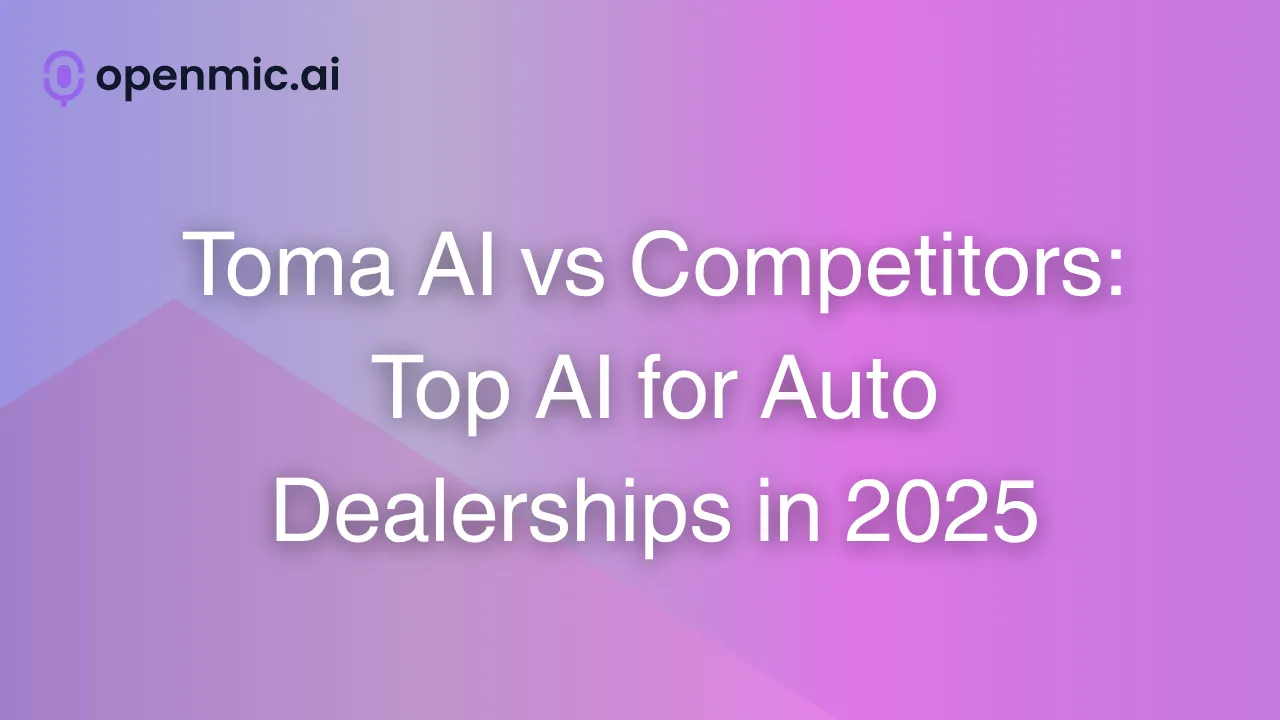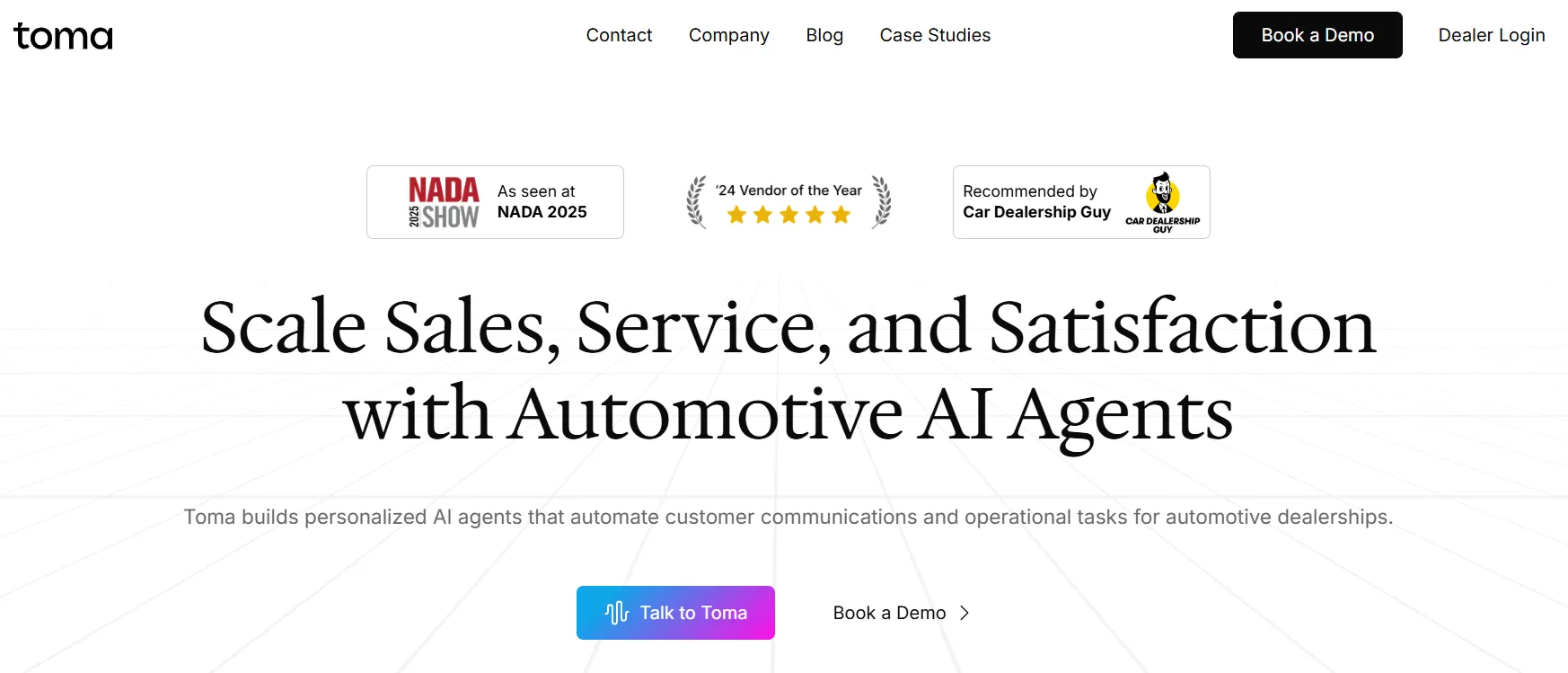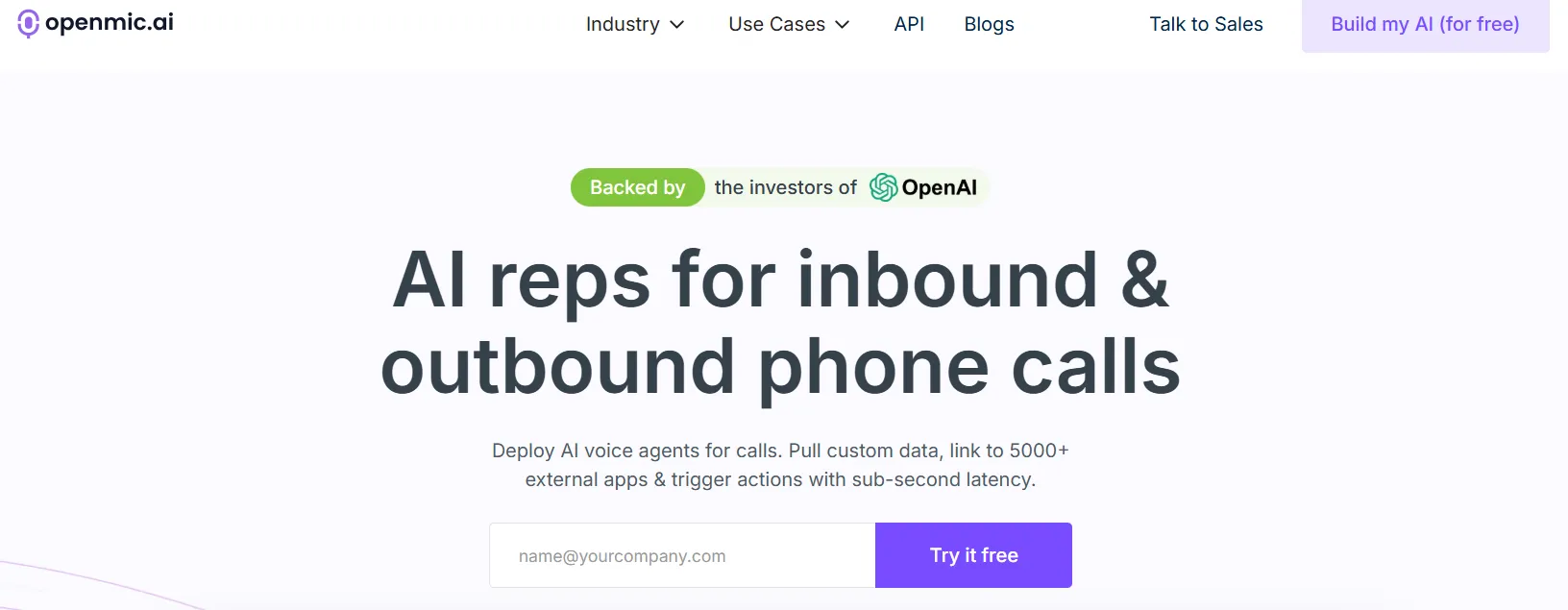
Toma AI vs Competitors: Best AI Agents for Automotive Dealerships in 2025
The automotive industry is evolving, and AI is playing a major role in helping dealerships run more efficiently. AI agents are automating tasks like customer communication, appointment scheduling, and more. One standout option is Toma AI, but several other AI platforms out there. In this article, we will take a closer look at Toma AI and compare it with other popular AI solutions like OpenMic AI, Caseflood, Rosie AI, and AutoCall AI. Let’s dive into which one is best for your dealership in 2025.
What is Toma AI?

Toma AI is an innovative platform that automates customer communications and streamlines operational tasks for automotive dealerships. It helps dealerships save time and resources by automating routine tasks, such as answering questions, scheduling appointments, and sending updates about vehicle availability.
Toma AI also offers personalized interactions, so customers receive more tailored communication. This improves the overall customer experience, helping dealerships stay ahead in a competitive market.
Features of Toma AI
Toma AI stands out because it offers a variety of features that are specifically designed to help automotive dealerships improve efficiency. Here are some of the key features:
- Automated Customer Communication: Toma AI can handle common customer inquiries, from questions about vehicle availability to service updates. It uses natural language processing to engage with customers in a way that feels personal and efficient.
- Appointment Scheduling: Toma AI can automatically schedule test drives, maintenance appointments, and even service reminders. This helps keep the dealership running smoothly without having to rely on human staff for every small task.
- Personalized Customer Interactions: Toma AI adapts to each customer's communication style, providing a more personal experience. Whether the customer prefers brief updates or detailed responses, Toma adjusts accordingly.
- Operational Efficiency: Toma AI helps dealerships reduce the workload on staff by automating repetitive tasks, which lets employees focus on more important aspects of customer service and sales.
Toma AI vs Competitors: A Look at the Alternatives
While Toma AI is a strong option, it’s important to consider other available platforms. Let’s compare Toma with some of its biggest competitors in the automotive AI space: OpenMic AI, Caseflood, Rosie AI, and AutoCall AI.
OpenMic AI: A Voice-Powered Solution

OpenMic AI is a voice-first dealership AI platform that turns every ringing phone into a smart, conversational touchpoint. It captures and understands spoken requests in real time, letting customers talk naturally instead of pressing buttons or waiting on hold. The system blends modern speech recognition with automotive-specific intent models, so callers can schedule service, ask about vehicle availability, or confirm pricing without human intervention.
Key Features
• Hands-free voice recognition tuned for dealership terms (model names, trim levels, VINs)
• Seamless integration with existing PBX or VoIP lines—no rip-and-replace hardware
• Real-time call routing and warm transfer to live agents when extra help is needed
• Automated call summaries and CRM logging to keep records tidy
• Multilingual support to serve diverse customer bases
Best For – Dealerships drowning in call volume that want to deliver fast, human-sounding answers 24/7 while keeping installation costs low.
Caseflood: Predictive Analytics for Targeted Marketing
Caseflood is a data-driven automotive dealership AI engine that predicts which shoppers will buy, when they will buy, and what will influence them most. By learning from historical sales, service visits, and engagement history, Caseflood surfaces high-intent leads so marketing dollars go further. Its machine-learning models constantly refresh with new data, letting teams adjust campaigns before prospects cool down.
Key Features –
• Predictive lead scoring that ranks contacts by likelihood to convert
• Behavioral segmentation using past click-throughs, calls, and showroom visits
• One-click campaign builder with AI-generated subject lines and SMS copy
• Native integrations with major CRM and DMS platforms for a single source of truth
• Dashboard forecasts that show expected sales lift from each audience segment
Best For – Dealers who want precise, numbers-backed marketing that targets ready-to-buy shoppers instead of broad blasts.
Rosie AI: A Versatile Assistant for Dealerships
Rosie AI acts as a full-service virtual assistant that unifies customer communication and back-office tasks. Think of it as the digital coworker who juggles appointment booking, inventory checks, and follow-up messages without complaining or clocking out. Because Rosie hooks into calendars, DMS records, and inventory feeds, it gives each shopper up-to-date answers while freeing staff to focus on closing deals.
Key Features –
• Omnichannel chat, email, and SMS handling from one unified inbox
• Automated service scheduling, test-drive booking, and recall notifications
• Real-time inventory sync so customers see only in-stock units
• Internal task automation—Rosie nudges staff when parts arrive or deals stall
• Analytics dashboard that highlights response times, open tickets, and CSI trends
Best For – Dealerships seeking an all-in-one AI helper to streamline daily operations and cut down on app overload.
AutoCall AI: Phone Call Automation
AutoCall AI is a specialized phone-call automation suite built for high-volume service bays and BDCs. Instead of overflowing voicemails or lost follow-ups, AutoCall handles repetitive conversations—think appointment confirmations, ready-for-pickup alerts, and simple FAQ answers—so agents can focus on revenue-generating calls. By combining natural language processing with customizable call flows, it maintains a friendly tone that feels almost human.
Key Features
• Outbound call scheduler for reminders, post-service surveys, and parts arrivals
• Inbound triage that routes complex questions to live advisors in seconds
• Speech-to-text transcription and sentiment scoring for quality monitoring
• Call outcome tagging and push-to-CRM logging for accurate record-keeping
• Simple drag-and-drop flow editor—no coding required to tweak scripts
Best For – Dealers whose phones never stop ringing and who crave consistent, automated call handling without the broader feature set (and cost) of larger platforms.
Which AI Solution is Right for Your Dealership?
When it comes to choosing the right AI platform for your dealership, it all depends on your specific needs.
- If you need a platform that can handle both customer communication and operational tasks, Toma AI is a great choice. It’s versatile and offers a full-service solution for dealerships.
- If your dealership focuses on voice interactions, OpenMic AI might be a better fit, as it allows for more natural, voice-driven customer communication.
- If you’re looking for a platform that provides predictive marketing analytics, Caseflood could be the ideal solution. It helps dealerships target the right customers based on data-driven insights.
- If you rely on phone calls for most of your communication, AutoCall AI can help automate those interactions, freeing up your staff to focus on other tasks.
Conclusion
In 2025, the competition in AI solutions for automotive dealerships is growing, and there are several great options to choose from. Toma AI offers a complete solution for automating customer communication and operational tasks. However, depending on your dealership’s needs, other platforms like OpenMic AI, Caseflood, Rosie AI, and AutoCall AI also offer unique features that may be a better fit.
Suppose you're looking for an all-in-one platform that automates both communication and tasks. In that situation, Toma AI is an excellent choice. However, if you prioritize voice-powered interactions, OpenMic AI is worth considering. Caseflood is the best option if your dealership focuses on data-driven marketing, while AutoCall AI is ideal for phone-based automation.
No matter which platform you choose, adopting AI can help your dealership run more efficiently, provide a better customer experience, and increase sales. If you're ready to improve your operations, consider OpenMic AI demo Session and see how it can streamline your dealership's communication and operational processes.
Explore related blogs
.png)
Voice AI for Mass Tort Lawyers: How Conversational AI Is Revolutionizing Case Intake & Client Engagement
.png)
Top 5 AI Answering Services for Law Firms in 2025 (24/7 Reception & Intake)
.png)
Top 5 White-Label Voice AI Platforms in 2025 (Best for Agencies & SaaS Providers)
Let AI Handle Your Phones So You Can Focus on Growth
Start your free trial and see how OpenMic’s AI voice agents can streamline calls, boost conversions, and deliver fast, 24/7 customer service — without hiring more staff.






.svg)